- Home
- Gore Vidal
Messiah Page 2
Messiah Read online
Page 2
Many cherished private hells were forever lost in those garrulous years and the vacuum each left was invariably filled with a boredom which, in its turn, could only be dispelled by faith. As a result, the pursuit of the absolute, in one guise or another, became the main preoccupation of these romanticists who professed with some pride a mistrust of the reason, derived quite legitimately from their own stunning incapacity to assimilate the social changes created by machinery, their particular Lucifer. They rejected the idea of the reflective mind, arguing that since both logic and science had failed to establish the first cause of the universe or (more important) humanity's significance, only the emotions could reveal to us the nature of reality, the key to meaning. That it was actually no real concern of this race why or when or how the universe came into being was an attitude never, so far as I can recall, expressed by the serious-minded of the day. Their searching, however, was not simply the result of curiosity; it was more than that: it was an emotional, senseless plunging into the void, into the unknowable and the irrelevant. It became, finally, the burden of life, the blight among the flowers: the mystery which must be revealed, even at the expense of life. It was a terrible crisis, made doubly hard since the eschewal of logic left only one path clear to the heart of the dilemma: the way of the mystic, and even to the least sensible it was sadly apparent that, lacking a superior and dedicated organization, one man's revelation is not apt to be of much use to another.
Quantities of venerable attitudes were abandoned and much of the preceding century's "eternal truths and verities" which had cast, rock-like, so formidable and dense a shadow, were found, upon examination, to be so much sand, suitable for the construction of fantastic edifices but not durable, nor safe from the sea's tide.
But the issue was joined: dubious art was fashioned, authorities were invoked, dreams given countenance and systems constructed on the evidence of private illumination.
For a time, political and social action seemed to offer a way out, or in. Foreign civil wars, foreign social experiments were served with a ferocity difficult to comprehend; but later, when the wars and experiments went wrong, revealing, after such high hopes, the perennial human inability to order society, a disillusion resulted, bitterly resolved in numerous cases by the assumption of some mystical dogma, preferably one so quaintly rich with history, so sweeping and unreasonable in its claims as to be thoroughly acceptable to the saddened romanticist who wanted, above all else, to feel, to know without reasoning. So in these portentous times, only the scientists were content as they constructed ever more fabulous machines with which to split the invisible kernels of life while the anti-scientifics leaped nervously from one absolute to another . . . now rushing to the old for grace, now to the new for salvation, no two of them really agreeing on anything except the need for agreement, for the last knowledge . . . and that, finally, was the prevailing note of the age; since reason had been declared insufficient, only a mystic could provide the answer, only he could mark the boundaries of life with a final authority, inscrutably revealed. It was so perfectly clear. All that was lacking was the man.
One
1
The garden was at its best that first week in the month of June. The peonies were more opulent than usual and I walked slowly through the green light on the terrace above the white river, enjoying the heavy odor of peonies and of new roses rambling in hedges.
The Hudson was calm, no ripple revealed that slow tide which even here, miles to the north of the sea, rises brackishly at the moon's disposition. Across the river the Catskills, water-blue, emerged sharply from the summer's green as though the earth in one vivid thrust had attempted sky, fusing the two elements into yet another, richer blue . . . but the sky was only framed, not really touched, and the blue of hills was darker than the pale sky with its protean clouds all shaped by wind, like the stuff of auguries and human dreaming.
The sky that day was like an idiot's mind, wild with odd clouds, but lovely too, guileless, natural, allusive.
I did not want to go in to lunch, although there was no choice in the matter. I had arrived at one o'clock; I was expected at one-thirty. Meanwhile, avoiding the house until the last possible moment, I had taken a neighbor's privilege of strolling alone about the garden; the house behind me was gray and austere, granitic, more English than Hudson Valley. The grounds swept softly down toward the river nearly a mile away. A vista had been cleared from the central terrace, a little like the one at Versailles but more rustic, less royal. Dark green trees covered the hills to left and right of the sweep of lawn and meadow. No other house could be seen. Even the railroad between the terrace and the water was invisible, hidden by a bluff . . . only its sound and an occasional blur of smoke upon the blue marked that machine's essential passage.
I breathed the air of early summer gladly, voluptuously. I lived my life in seasonal concert with this river and, after grim March and confusing sharp April, the knowledge that at last the leaves were foliaged and the days warm was quite enough to create in me a mood of euphoria, of marvelous serenity. I contemplated love affairs. I prepared to meet strangers. The summer and I would celebrate our triumph soon; but, until the proper moment, I was a spectator: the summer love as yet unknown to me, the last dark blooming of peonies amid the wreckage of white lilacs still some weeks away, held in the future with my love. I could only anticipate; I savored my disengagement in this garden.
But then it was time to go in and I turned my back resolutely on the river and ascended the wide stone steps to the brick terrace which fronted the house on the river side, pausing only to break the stem of a white and pink peony, regretting immediately what I had done: brutally, I had wished to possess the summer, to fix the instant, to bear with me into the house a fragment of the day. It was wrong; and I stood for a moment at the French door holding the great peony in my hand, its odor like a dozen roses, like all the summers I had ever known. But it was impractical. I could not stuff it into my buttonhole for it was as large as a baby's head while I was fairly certain that my hostess would be less than pleased to receive at my hands one of her best peonies, cut too short even to place in water. Obscurely displeased with myself and the day, I plunged the flower deep into a hedge of boxwood until not even a glimmer of white showed through the dense dark green to betray me: then, like a murderer, the assaulted day part-spoiling, I went inside.
2
"You have been malingering in the garden," she said, offering me her face like a painted plate to kiss. "I saw you from the window."
"Saw me ravage the flowers?"
"They all do," she said obscurely, and led me after her into the drawing room, an oblong full of light from French windows opening upon the terrace. I was surprised to see that she was alone.
"She'll be along presently. She's upstairs changing."
"Who?"
"Iris Mortimer . . . didn't I tell you? It's the whole reason."
Clarissa nodded slyly from the chair opposite me. A warm wind crossed the room and the white curtains billowed like spinnakers in a regatta. I breathed the warm odor of flowers, of burned ash remnants from the fireplace: the room shone with silver and porcelain. Clarissa was rich despite the wars and crises that had marked our days, leaving the usual scars upon us, like trees whose cross-sections bear a familial resemblance of concentric rings, recalling in detail the weather of past years . . . at least those few rings we shared in common, for Clarissa, by her own admission, was twenty-two hundred years old with an uncommonly good memory. None of us had ever questioned her too closely about her past. There is no reason to suspect, however, that she was insincere. Since she felt she had lived that great length of time and since her recollections were remarkably interesting and plausible she was much in demand as a conversationalist and adviser, especially useful in those plots which require great shrewdness and daring. It was perfectly apparent that she was involved in some such plot at the moment.
I looked at her thoughtfully before I casually rose to take the bait
of mystery she had trailed so perfunctorily before me.
She knew her man. She knew I would not be difficult in the early stages of any adventure.
"Whole reason?" I repeated.
"I can say no more!" said Clarissa with a melodramatic emphasis which my deliberately casual tone did not entirely justify. "You'll love Iris, though."
I wondered whether loving Iris, or pretending to love Iris, was to be the summer's game. But before I could inquire further, Clarissa, secure in her mystery, asked me idly about my work and, as idly, I answered her, the exchange perfunctory yet easy, for we were used to one another.
"I am tracking him down," I said. "There is so little to go on, but what there is is quite fascinating, especially Ammianus."
"Fairly reliable, as military men go," said Clarissa, suddenly emerging from her polite indifference: any reference to the past she had known always interested her, only the present seemed to bore her, at least that ordinary unusable present which did not contain promising material for one of her elaborate human games.
"Did you know him?" I never accepted, literally, Clarissa's unique age: two thousand years is an unlikely span of life even for a woman of her sturdy unimaginativeness; yet there was no ignoring the fact that she seemed to have lived that long, and that her references to obscure episodes, where ascertainable, were nearly always right and, more convincing still, where they differed from history's records, differed on the side of plausibility . . . the work of a memory or a mind completely unsuperstitious and unenthusiastic: (she was literal; she was, excepting always her central fantasy, matter-of-fact. To her the death of Caesar was the logical outcome of a system of taxation which has not been preserved for us except in quaintly obscure references; while the virtue of the Roman republic and the ambitions of celebrated politicians, she set aside as being of only minor importance: currency and taxation were her forte and she managed to reduce all the martial splendor of ancient days to an economic level).
She had one other obsession, however, and my reference to Ammianus reminded her of it.
"The Christians!" she exclaimed significantly; then she paused; I waited. Her conversation at times resembled chapter-headings chosen haphazardly from an assortment of Victorian novels. "They hated him."
"Ammianus?"
"No, your man Julian. It is the Emperor Julian you are writing about."
"Reading about."
"Ah, you will write about him," she said with an abstracted pythoness stare which suggested that I was indefatigable in my eccentric purpose which, for some years, had been the study of history in a minor key.
"Of course they hated him. As well they should have . . . that's the whole point to my work."
"Unreliable, the lot of them. There is no decent history from the time they came to Rome up until that fat little Englishman . . . you know, the one who lived in Switzerland . . . with rather staring eyes."
"Gibbon."
"Yes, that one. Of course he got all the facts wrong, poor man, but at least he tried. The facts of course were all gone by then. They saw to that . . . burning things, rewriting things . . . not that I really ever read them . . . you know how I am about reading: I prefer a mystery novel any day. But at least Gibbon got the tone right."
"Yet . . ."
"Of course Julian was something of a prig, you know. He posed continually and he wasn't . . . what do they call him now? an apostate. He never renounced Christianity."
"He what . . ."
Clarissa in her queer way took pleasure in rearranging all accepted information. I shall never know whether she did it deliberately to mystify or whether her versions were, in fact, the forgotten reality.
"He was a perfectly good Christian au fond despite his peculiar diet. He was a vegetarian for some years but wouldn't eat beans, as I recall, because he thought they contained the souls of the dead, an old orphic notion."
"Which is hardly Christian."
"Isn't that part of it? No? Well in any case the first proclamation of Paris was intended . . ." but I was never to hear Julian's intent for Iris was in the doorway, slender, dressed in white, her hair dark and drawn back in a classical line from her calm face: she was handsome and not at all what I had expected, but then Clarissa had, as usual, not given me much lead. Iris Mortimer was my own age, I guessed, about thirty, and although hardly a beauty she moved with such ease, spoke with such softness, created such an air of serenity that one gave her perhaps more credit for the possession of beauty than an American devoted to regular features ought, in all accuracy, to have done: the impression was one of lightness, of this month of June in fact . . . I linger over her description a little worriedly, conscious that I am not really getting her right (at least as she appeared to me that afternoon) for the simple reason that our lives were to become so desperately involved in the next few years and my memories of her are now encrusted with so much emotion that any attempt to evoke her as she actually was when I first saw her in that drawing room some fifty years ago is not unlike the work of a restorer of paintings removing layers of glaze and grime in an attempt to reveal an original pattern in all its freshness somewhere beneath . . . except that a restorer of course is a workman who has presumably no prejudice and, too, he did not create the original image only to attend its subsequent distortion, as the passionate do in life; for the Iris of that day was, I suppose, no less and no more than what she was to become; it was merely that I could not suspect the bizarre course our future was to take. I had no premonition of our mythic roles, though the temptation is almost overpowering to assert, darkly, that even on the occasion of our first meeting I knew. The truth is that we met; we became friends; we lunched amiably and the future cast not one shadow across the mahogany table around which we sat, listening to Clarissa and eating fresh shad caught in the river that morning.
"Eugene here is interested in Julian," said our hostess, lifting a spring asparagus to her mouth with her fingers.
"Julian who?"
"The Emperor of Rome. I forget his family name but he was a nephew, I think, of Constantius, who was dreary too though not such a bore as Julian. Iris, try the asparagus. We get them from the garden."
Iris tried an asparagus and Clarissa recalled that the Emperor Augustus's favorite saying was: "Quick as boiled asparagus." It developed that he had been something of a bore, too.
"Hopelessly involved in office work. Of course it's all terribly important, no doubt of that . . . after all the entire Empire was based on a first-rate filing system; yet, all in all, it's hardly glamorous."
"Whom did you prefer?" asked Iris, smiling at me: she too was aware of our hostess's obsession; whether or not she believed is a different matter. I assumed not; yet the assumption of truth is perhaps, for human purposes, the same as truth itself, at least to the obsessed.
"None of the obvious ones," said Clarissa, squinting near-sightedly at the window through which a pair of yellow-spangled birds were mating on the wing like eccentric comets against the green of box. "But of course, I didn't know everyone, darling. Only a few. Not all of them were accessible. Some never dined out. Some that did go out were impossible and then of course I traveled a good deal. I loved Alexandria and wintered there for over two hundred years, missing a great deal of the unpleasantness at Rome, the unstability of those tiresome generals . . . although Vitellius was great fun, at least as a young man. I never saw him when he was Emperor that time, for five minutes wasn't it? Died of greed. Such an appetite! On one occasion as a young man he ate an entire side of beef at my place in Baiae. Ah, Baiae, I do miss it. Much nicer than Bath or Biarritz and certainly more interesting than Newport was. I had several houses there over the years. Once when Senator Tullius Cicero was traveling with that poisonous daughter of his, they stopped . . ."
We listened attentively as one always did to Clarissa . . . does? I wonder if she is still alive: if she is, then perhaps the miracle has indeed taken place and one human being has finally avoided the usual fate. It is an amiable miracle to c
ontemplate.
Lunch ended without any signs of that revelation which Clarissa had led me to expect. Nothing was said which seemed to possess even a secret significance. Wondering idly whether or not Clarissa might, after all, be entirely mad, I followed the two women back into the drawing room where we had our coffee in a warm mood of satiety made only faintly disagreeable for me by that mild nausea which I always used to experience when I drank too much wine at lunch: now of course I never see wine, only the Arabs' mint tea and their sandy bitter coffee which I have come to like.
A warm breeze fluttered the curtains: the noise of insects responding to the sun's increasing heat droned all upon the same note, dry and insistent, a bass to the coloratura of birds, while the scent of flowers filled the airy room and I detected lilies as well as peonies, their odor almost too sweet, quite drowning the more delicate rose, the pale Hudson lilac. Clarissa reminisced idly. She possessed a passion for minor detail which was often a good deal more interesting than her usual talks on currency devaluation.
Neither Iris nor I spoke much; it was as if we were both awaiting some word from Clarissa which would throw into immediate relief this luncheon, this day, this meeting of strangers. But Clarissa only gossiped on; at last, when I was beginning to go over in my mind the various formulae which make departure easy, our hostess, as though aware that she had drawn out too long the overture, said abruptly, "Eugene, show Iris the garden. She has never seen it before." And then, heartily firing fragments of sentences at us as though in explanation of this move of hers, she left the room, indicating that the rest was up to us.

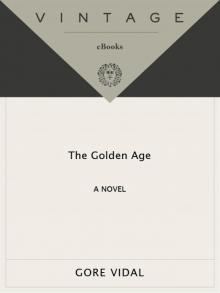 The Golden Age: A Novel
The Golden Age: A Novel Death Before Bedtime
Death Before Bedtime Burr
Burr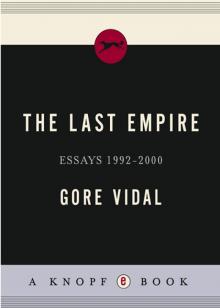 The Last Empire
The Last Empire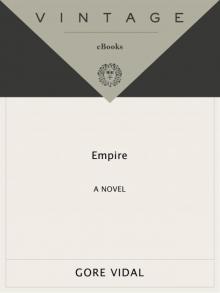 Empire: A Novel
Empire: A Novel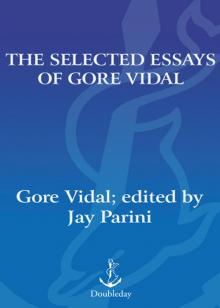 The Selected Essays of Gore Vidal
The Selected Essays of Gore Vidal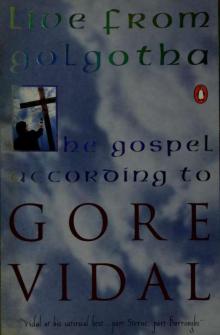 Live From Golgotha
Live From Golgotha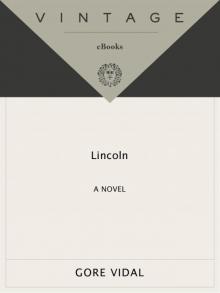 Lincoln
Lincoln Death Likes It Hot
Death Likes It Hot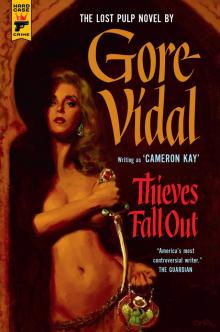 Thieves Fall Out (Hard Case Crime)
Thieves Fall Out (Hard Case Crime) Point to Point Navigation
Point to Point Navigation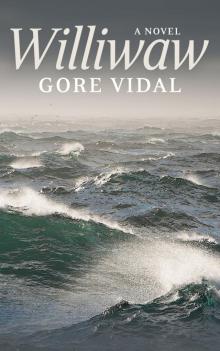 Williwaw
Williwaw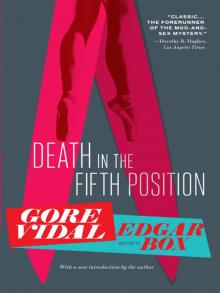 Death in the Fifth Position
Death in the Fifth Position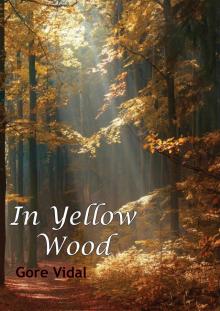 In a Yellow Wood
In a Yellow Wood Julian
Julian Hollywood
Hollywood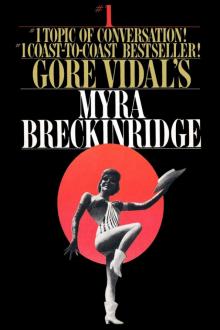 Myra Breckinridge
Myra Breckinridge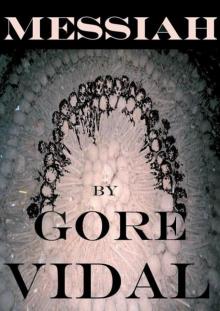 Messiah
Messiah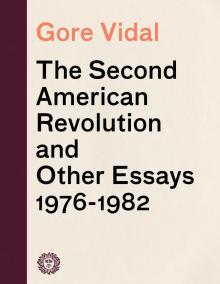 The Second American Revolution and Other Essays 1976--1982
The Second American Revolution and Other Essays 1976--1982 Homage to Daniel Shays
Homage to Daniel Shays Empire
Empire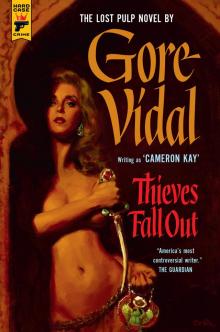 Thieves Fall Out
Thieves Fall Out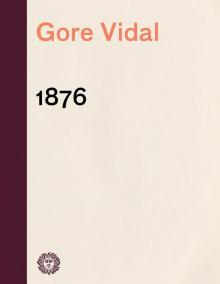 1876
1876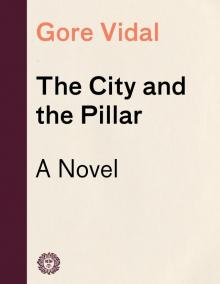 The City and the Pillar
The City and the Pillar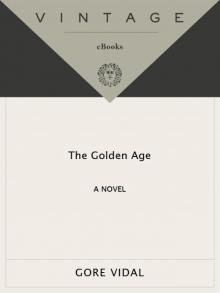 The Golden Age
The Golden Age At Home
At Home